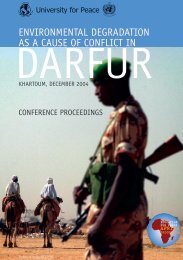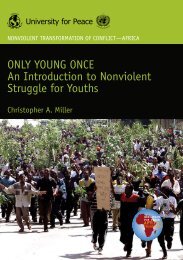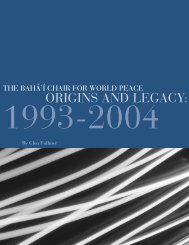who medicines strategy - libdoc.who.int - World Health Organization
who medicines strategy - libdoc.who.int - World Health Organization
who medicines strategy - libdoc.who.int - World Health Organization
You also want an ePaper? Increase the reach of your titles
YUMPU automatically turns print PDFs into web optimized ePapers that Google loves.
WHO MEDICINES STRATEGY 2004-2007 | 122EO 7.5Consumer education enhancedin recognition of the growingsignificance of self-medication andof consumer access to knowledgeand advice of variable qualityRationaleConsumers of <strong>medicines</strong> are the final decisionmakerson the use of <strong>medicines</strong>, whetherprescribed or purchased over the counter withoutprescription. However, insufficient attention ispaid to consumer education on the importanceof rational use of <strong>medicines</strong>. Self-medication isincreasing in importance, either by default or asa result of deliberate public policy. In developingcountries today, out-of-pocket spending byconsumers is the main source of spending on<strong>medicines</strong>. In many countries, the distinctionbetween prescription-only and over-the-counter<strong>medicines</strong> is meaningless as almost all <strong>medicines</strong>are available for sale.ProgressThe need for skills development for communityeducation in rational medicine use has beenclearly identified in WHO research. In response,a new <strong>int</strong>eractive and skills-oriented trainingprogramme on community education in therational use of <strong>medicines</strong> has been developedby WHO, in partnership with the Universityof Amsterdam and an experienced group ofdeveloped and developing country experts, andmade available in Asia and Africa. In addition,two manuals, one on investigating drug use incommunities and the other on <strong>int</strong>erventionsto change <strong>medicines</strong> use in communities, arebeing prepared by partners at the University ofAmsterdam.Challenges remainingDespite the risks to personal health frommisguided self-medication or the inappropriateuse of prescribed treatment by consumers, the fullimpact of these practices cannot be quantified.The challenge is to promote rational use of<strong>medicines</strong> amongst consumers with the samelevel of success as the pharmaceutical industryachieves in marketing their products. As yetthere is limited information available as to whichare the most effective <strong>int</strong>erventions for use indeveloping and transitional countries. Furtherresearch is needed in different environments andsectors.Meeting the challenges 2004-2007Over the next four years WHO will:> support efforts to provide information andeducation designed to improve rationaluse of <strong>medicines</strong> by consumers. The longtermaim of the training programme oncommunity education is to develop a networkof trained people committed to implementingcommunity education in rational use of<strong>medicines</strong>, evaluating the impact of theirwork, reporting on experience, and sharingexpertise.> promote and support systematic researchactivities aimed at identifying the mosteffective <strong>int</strong>erventions for improving rationaluse.OUTCOME INDICATORS1999 2003 2007No. of countries that have implemented a nationalconsumer education campaign in the last two years#REPORTING % TARGET#REPORTING % TARGETna na na 72/120 60% 60%











